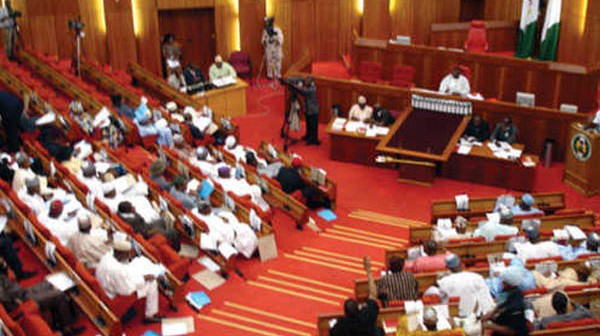The Seventh Senate of the Federal Republic of Nigeria on Thursday ended its tenure with a valedictory session witnessed by past leaders of the institution.
In his closing speech, Senate President David Mark congratulated his colleagues for a successful session reeling out bills initiated by the lawmakers which eventually became laws after assent by the executive.
Senate Leader, Victor Ndoma-Egba said the Seventh Senate considered and passed 123 out of the 591 bills introduced to the upper chamber in the last four years while the rest were in different stages of legislative processes.
A last minute effort to veto the non-assent of the fourth amendment of the 1999 Constitution hit a brick-wall and was stepped down by the Senate Leader, Victor Ndoma-Egba.
Most senators that spoke praised the seventh National Assembly for stabilizing Nigeria’s democracy and challenging executive excesses
Meanwhile, the House Of Representatives on Thursday passed the contentious Petroleum Industry Bill (PIB) into law. However, the 7th senate did not concur with the passage, as it ended on Thursday.
In his valedictory speech, Senate President David Mark had cited the failure to pass the bill as one of the low points of the outgoing senate. On May 13, the house had commenced consideration of its ad hoc committee’s report on the bill, which has been in the national assembly since 2008. One of the kernels of the bill is the abolishment of the discretionary power of the president to grant petroleum licenses.
Although, the-clause-by-clause review of the bill was suspended following a string of observations raised by lawmakers on legal technicalities, the process for the eventual passing of the bill was initiated culminating in its passage. The 368-page document is made up of 312 sections and 438 clauses. Clause 209, which deals with revenue sharing formula, and clauses 116 and 119 which deal with the reduction of levy on oil companies, had generated much controversy, but the PIB was passed in what appeared to be a hurried process.
After the house had given its nod to the bill, Emeka Ihedioha, deputy speaker, who presided over the sitting, thanked them for a “job well-done.” He noted that the passing of the bill was in the interest of the country and not political, adding that it was left for the senate to do its own share of legislative work on it.
Back in January, Senate President David Mark had assured Nigerians as well as stakeholders in the oil industry that the PIB would be passed before the end of the 7th senate, but his promise was not fulfilled. The house also passed 16 bills after it suspended some portions of its standing orders in a motion moved by Mulikat Akande Adeola, house leader, which implied that the bills had passed the legislative process.
Some of the bills passed are the National Social Welfare Commission Bill 2015, Proceeds of Crime Bill 2015, Corporate Manslaughter Bill 2015, Labour Safety and Health Bill 2015, Nigerian Football Association (Repeal and Re-enactment) Bill 2015 and Criminal Justice (Release from custody) (Special provisions) Amendment Bill 2015.



Leave a Reply